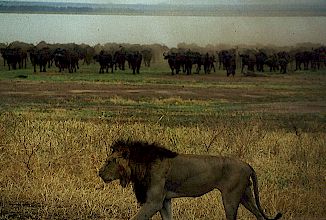 |
The trip from Mombasa to Dar es Salaam inTanzania was very strenuous. Little is left from what used to be bitumen roads and the rest were sandy tracks in the first place. On top of that both the temperature and the humidity was uncomfortable and so were the swarms of the Tse Tse flies. These flies used to bite us from the back, however fast we would pedal, using our wind shadow to their advantage.
We visited the island of Zanzibar, part of Tanzania, by Boat on a 4-hour trip. The inner city of Zanzibar, with its small and narrow passages is disintegrating, while on the outskirts we found the ugly, long, socialistic-uniform, multi-storeyed blocks of flats, built with east German aid in the sixties. The remainder of the island is overgrown by huge palm plantations, in whose shadows the famous spices grow and, of course the long white beaches. The people of Zanzibar are friendly, helpful and proud. They enjoy cinema tremendously, specifically American action- or Indian soaps, which are greeted with huge applause -never mind the story, as long as there is action.
We decide to repair our bikes and while we are at it, help a local with his. No spare parts are available on the island and we try our best. The boy is happy and his father, once a bike racer himself is very proud.
Back on the mainland, we pick up the challenge of crossing Tanzania. Not the easiest phase of our journey, since from the coast our path leads steadily upwards to Zambia. The surroundings of pine trees and green meadows remind us of the black forest back home, and the smell of the needles transport us to Christmas as we celebrate on the road side. A German doctor from Tanzania surprises us with traditional German biscuits. Zambia and Zimbabwe, the neighbouring countries, consist mainly of plateaus. Because of the height, (1300 m above sea level) the climate is bearable. Our meals consist mainly of bananas and maize, as there are no shops along the road. This road leads through the isolated bush land that was built in 1975 and is still in good condition. On coming traffic is non-existent, an average of one car passing us every four hours! Our tents had been slashed despite pitching it next to a police station, so we now prefer to overnight in schools and on farms. Some of these farms have been in families for three generations, however many of the farm owners have left Zambia since the country underwent an economical crisis of magnanimous proportions. Immense copper deposits in the north west of the country benefit the President and English mining companies exclusively, but the drop in copper price is also partially to blame.
There is latent fear of spies resulting from the guerrilla movements of previous Rhodesian regime. Not only are we thoroughly searched at the borders, but also every letter and pill container is suspect and examined. I am also urged in Lusaka
to stop writing in my daily diary in public for I am making myself conspicuous. As we bike on the outskirts of the city, we are being followed by individuals who take hold of and sever, with a knife, half of my luggage while yelling, "spy, spy". Trying to escape in a hurry I stumble, fall, and a passing car stops, the driver of which helps me up and even retrieves my bags. Following the driver's suggestion, I speedily move on. All of this has occurred in broad daylight and none of the observers has tried to intervene. Mugging or political act?
We are relieved to finally cross into Zimbabwe
at Livingstone, but
our relief is short lived. The border officials (and ex-Rhodesian) want to
deny us entry for not being in possession of a return flight ticket. Back
to Zambia? Without a visa? Not a good feeling being stuck between two borders.
This bureaucrat seems inflexible. Behind us lies 14 African borders and it seems as if our journey is to stop at Vic Falls. Finally, repetitive pleas and a contact address in the capital save us. The boom is lifted. Soon after this incident, we hear from a fellow that he needed neither a return flight ticket nor a visa as proof of sufficient means to enter. Such is Africa-there are no rules. Everything is possible and it comes down to fortunate timing.
Victoria Falls compensates for our shock and stress. 1.7 km wide, the Zambezi River drops 110 meters at its falls. What an overwhelming view. The mist of the spray raises 100 metres and gives rise to the rainbow and mini rain forest on the rivers edge.
Our appetites are being supported again; there
are even two supermarkets to choose from! A day after our arrival the cities
yoghurt supply is diminished. Being nourished like this again, the next 500
kms through the bush to Bulawayo
does not pose any challenge.
Once again, there are no markets on the way, but the road meets European standards. Owing to our height above sea level, the enhanced sun burns my hands, but a pair of socks solves the problem. My bicycle shows some wear and tear after 20 000 kms. Another 400 kms to the South African border-the thought soothes us as all our needed spare parts will be readily available. It will then be another 2500 kms to our final destination-Cape Town.
To download page Beginning of page Next page